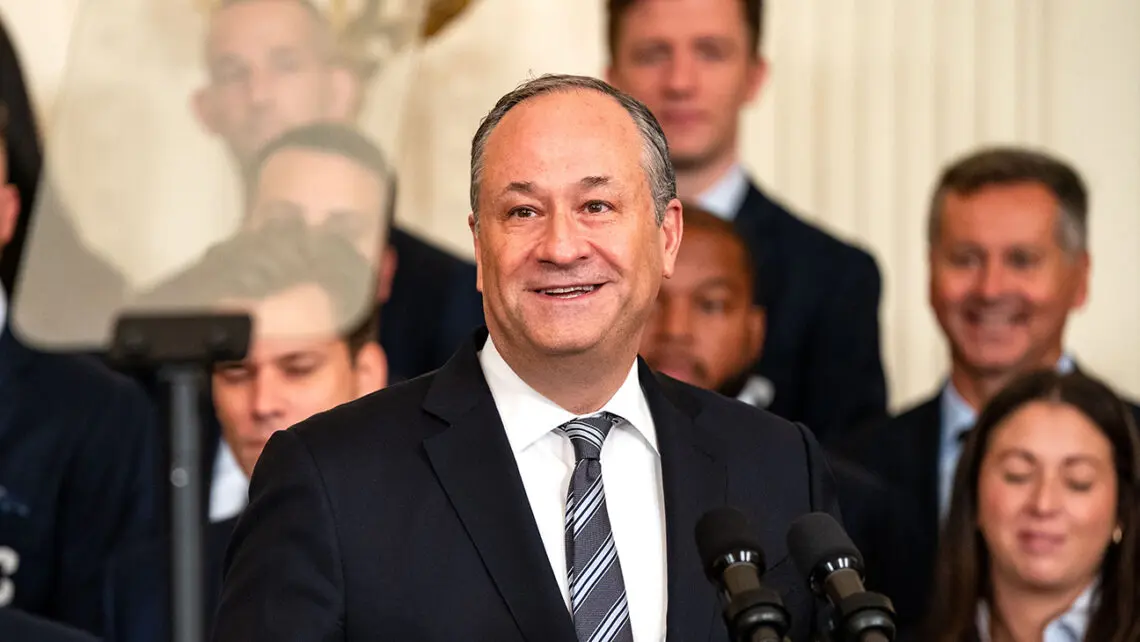Doug Emhoff shares his thoughts on Saturday Night Live impersonations
SNL’s take on the Second Gentleman
When it comes to comedy and impersonations, few platforms have the cultural weight of Saturday Night Live. Recently, Doug Emhoff, the Second Gentleman of the United States, shared his perspective on the iconic show’s portrayals of him. Engaging in a candid conversation, Emhoff dived into the nuances of seeing himself portrayed by comedic titans like Martin Short and Andy Samberg.
The battle of comedic legends
Martin Short and Andy Samberg—two names that reverberate through Hollywood with comedic brilliance. Emhoff was asked the burning question: Who nailed the role best? With a chuckle, he remarked, “Martin Short is way older and shorter, but he actually got me.” Speaking on the Politickin’ podcast, he delved into the nuances of each actor’s rendition. “Samberg — it’s good, it’s funny. It’s not quite me, but some of the lines are pretty good.”
Martin Short’s touch
Short’s interpretation came at a pivotal moment during the last presidential election in 2020, when Kamala Harris, Emhoff’s wife, stepped into the national spotlight. Short’s portrayal wasn’t just about physical resemblance or mimicry; it encapsulated the essence of Emhoff in a way that genuinely resonated with him.
Andy Samberg’s twist
When SNL made its return ahead of the recent November elections, Samberg donned the mantle of the Second Gentleman. Emhoff noted, “Samberg has the hair down,” pointing out that while the viral “Dougy” dance was funny, it wasn’t entirely accurate. Nevertheless, Samberg brought a unique flair to the role, blending humor with subtle critiques.
Growing up with SNL
Reflecting on his experiences, Emhoff shared, “This is a show I watched literally, my whole life.” SNL debuted half a century ago, embedding itself into the cultural tapestry of several generations. Emhoff recalled, “We all stayed up for [it] and watched — and throughout the week, we would repeat all the iconic skits.”
The surreal experience
Emhoff admitted that seeing himself on the show was a surreal experience. “The group chats blow up on that kind of stuff… it’s one of many surreal things that I’ve experienced in this world, I love it.” The notion of transitioning from a lifelong fan to a facet of its content added an unexpected twist to his journey.
Maya Rudolph’s portrayal of Kamala Harris
The discussion naturally veered towards Maya Rudolph’s portrayal of Kamala Harris. Emhoff didn’t hold back in his praise, “She’s really upped her game.” Rudolph’s performance not only brought laughs but also a sense of authenticity, capturing the spirit of the Vice President with an impressive depth. “She came back this time. It’s like, wow. She’s so on it. She’s done a really good job.”
A cast of characters
This season of SNL is brimming with stellar impersonations, from James Austin Johnson taking on Donald Trump to Jim Gaffigan’s Tim Walz. Bowen Yang and Dana Carvey also added their talents to the mix, portraying J.D. Vance and Joe Biden respectively. The ensemble cast brings a dynamic range of humor and sharp political commentary, solidifying SNL’s continued relevance in today’s landscape.
Technical analysis of portrayals
From a technical standpoint, the success of these impersonations hinges on a blend of scriptwriting, acting prowess, and direction. Short’s version of Emhoff, for instance, excelled in capturing his mannerisms and facial expressions, much to the delight of audiences and Emhoff himself. Samberg’s rendition, although different, leveraged his knack for physical comedy and timing, ensuring that every sketch was memorable.
Scriptwriting’s role
Scriptwriting plays a fundamental role in the success of these sketches. The writers balance humor with accuracy, drawing from real-life events and personal quirks to bring each character to life. This nuanced approach allows actors like Samberg and Rudolph to imbue their performances with layers of meaning, providing viewers with more than just surface-level imitations.
The cultural impact of impersonations
Impersonations on SNL transcend mere comedy; they mirror societal perceptions and prompt viewers to reflect on their own viewpoints. By skillfully blending satire with subtle truths, SNL’s characters often spark wider conversations about political figures and events. This season’s array of portrayals continues that tradition, shaping public discourse in profound ways.
For more engaging articles and the latest updates in the world of TV and film, follow us on social media. Dive deeper into the nuances of your favorite shows and characters by staying connected with our content.

 Italian
Italian







